Meet our G@V fellows
Funded projects
2022 call
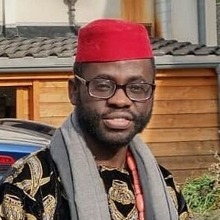
Arreyndip Nkongho Ayuketang
ADRR2023 - When concurrent extreme weather events meet breadbasket regions in escalating inter-regional conflict: Cascading economic impact assessment in the global food market
The ADRR2023 project aims to assess the first and high-order economic impacts on the regional and global food markets when extreme weather events occur over a breadbasket region/regions involved in an escalating inter-regional conflict with a case study of the Russia-Ukraine war. This project will also model other scenarios involving breadbasket regions likely to be involved in escalating conflicts, such as the emerging conflicts between Russia and NATO, Russia and the U.S., China and the U.S., and China and Taiwan, along with projected weather extremes under future warming. Additionally, the project will investigate the benefits of climate mitigation and conflict resolutions on the food market. This approach and the expected results will help raise awareness of impending economic crises before they occur, and thus provide early preparedness.
Research Institute for Complexity
Supervisor: Francesco Bosello, Department of Environmental Sciences, Informatics and Statistics
Duration: 24 months, from October 2023

Juan Alberto Ruiz Casado
Constructing the “enemy”: A discourse theoretical analysis of the hegemonic struggle for Taiwan (TaiwanDTA)
TaiwanDTA addresses contemporary discourses concerning the Taiwan Strait conflict, both within and outside of Taiwan, in the context of the multifaceted hegemonic competition between China and the US. Discursive practices regarding Taiwan have undergone a systemic change since 2016, leading to a rise in polarization, distrust, and antagonism. The general research objectives are to explore: 1) how the signifiers “Taiwan” and “China” are articulated by hegemonic and counter-hegemonic discourses; and 2), how “Taiwaneseness” is constructed vis-à-vis the “Chinese threat” in political, journalistic, and academic spheres. One particular contribution is to analyse the effects of Manichean anti-China imaginaries in the Western-centric hegemonic narrative. The project employs an interdisciplinary methodological approach that combines discourse-theoretical analysis (DTA) with diverse fields including history, privilege, IR, and populism. The ultimate goal of this project is to advance the understanding of the Taiwan Strait conflict, which would lead to better policies and decision-making to address this global security challenge.
Research Institute for Social Innovation
Supervisor: Duccio Basosi, Department of Linguistics and Comparative Cultural Studies
Duration: 24 months, from July 2023
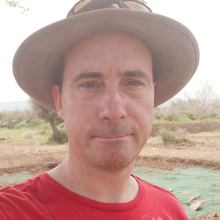
Frédéric Mège
BICAS – Building and Inhabiting the City in Ancient Sicily
The project BICAS proposes to investigate the route of construction stone from the quarry to the building in two cities of Ancient Sicily, Megara Hyblaia and Selinous, between the 7th and the 1st centuries BCE. The strategies set up by the inhabitants to find, to get and to use this material tell us a great deal about the way these ancient cities have developed. Several types of survey, when combined, will fuel the inquiries on extraction and transportation methods, so as to understand the working modes. Secondly, the study of the interconnections between the stone quarries, the transportation routes and the urban space will shed light on the way each city exerted command on its territory. Finally, BICAS will give insights on the socio-political evolutions in the metropolis (Megara) and its colony (Selinous), under the prism of their respective building programmes. Based on innovative tools and cross-disciplinary approach, the project will yield unprecedented information on how the inhabitants of Megara Hyblaia and Selinous concretely constructed their cities. Furthermore, the close comparison with a similar on-going project in Delos and Delphi will lead to a global understanding of the topic in the ancient Greek World.
Research Institute for Digital and Cultural Heritage
Supervisor: Luigi Sperti, Department of Humanities
Duration: 24 months, from December 2023

Claudia Stern
CONCHILMEM Condorito: Using graphic humor to untangle subjectivities of trauma, classes, gender, and the idea of race across Chile’s divided memory (1970-1990)
CONCHILMEM interprets multidimensional cultural trauma in Chile through white humor in the context of Salvador Allende’s Chilean Road to Socialism (1970-1973) and the military regime of Augusto Pinochet (1973-1990), a period crucial to understanding Chile’s present-day political and constitutional renewal. The project presents a new path through the field of transnational history within Cold War studies, and offers the first examination of the Condorito strip created by Pepo (René Ríos Boettiger) in 1949 in this context. The aim is to put forward a new perspective on memory studies through fresh interpretations in the fields of social and cultural history, approaching intersubjectivity via intersectional methods and theories.
Research Institute for Digital and Cultural Heritage
Supervisor: Luis Fernando Beneduzi, Department of Linguistics and Comparative Cultural Studies
Duration: 24 months, from October 2023
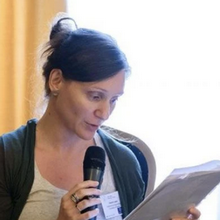
Daphne Lappa
CraftingOrthodoxies - Borderland Religiosity in the Eastern Mediterranean: Greeks and Latins Crafting Local Christian Orthodoxies. The Cases of Venetian Corfu and Ottoman Naxos, 17th-early 19th centuries
What did it mean to be an Orthodox or a Catholic in the premodern world? Μore concretely, were these categories internally uniform across space (i.e. being and Orthodox in Ottoman Istanbul or in the Venetian Maritime State; being Catholic in Rome or in the Ottoman Aegean)? Or were these configurations contingent, determined on a local level and entrenched in concrete political and cultural entities? To address these questions, the project examines the religious practices of Orthodox and Catholic Christians in the Eastern Mediterranean bringing together two case studies, Venetian Corfu and Ottoman Naxos between the 17th and the early 19th centuries. Endorsing the idea of the Eastern Mediterranean as a borderland where cultures meet and clash, the project suggests approaching these Christian religious practices as a phenomenon of borderland religiosity: a religiosity crafted from the interaction between Orthodox and Catholics featuring new, mixed religious practices, which constituted the local orthodoxies and orthopraxies, and decisively defined the very way of being Orthodox and Catholic.
Research Institute for Digital and Cultural Heritage
Supervisor: Giovanni Vian, Co-supervisor Elena Bacchin, Department of Humanities
Duration: 24 months, from October 2023
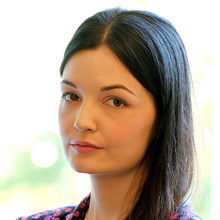
Noemi Quagliati
BEVVL - Bird’s-Eye Views of the Venetian Lagoon. Planetary Visions and Birdscapes of an Aquatic Ecosystem
The bird’s-eye view has turned nowadays, from an elevated oblique perspective of urban painted scenes, into a vertical gaze that produces detailed satellite images taken perfectly perpendicular to the Earth’s surface and appreciated for their scientific measurability. Focusing on the Venetian Lagoon’s constant monitoring from above, the first part of this project analyzes the role aerial and satellite images play in scientific communication of the climate and environmental crises to the public, influencing at the same time the European political agenda since the 1970s. In contrast, the second part challenges the human-centered historical narration of the aerial perspective by reflecting on the literal meaning of the expression Bird’s-Eye View. Offering a cultural history of the bird’s-eye view by studying animal-human-technology interactions, BEVVL contributes to theorizing the "distant view" in the Anthropocene epoch. Moreover, it "ecologizes" the field of art history and visual studies by investigating more-than-human geographies of the Venetian Lagoon and exploring the role of animals, specifically birds, as sentinels for environmental health.
Research Institute for Digital and Cultural Heritage; THE NEW INSTITUTE Center for Environmental Humanities (NICHE)
Supervisor: Cristina Baldacci, Department of Philosophy and Cultural Heritage
Duration: 24 months, from January 2024
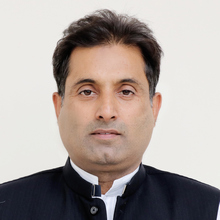
Sana Ullah
FunO4StablePSCs: Functional Metal Oxides for Stable Perovskite Solar Cells Perovskite Solar Cell (PSC)
The PSC technology has shown tremendous power conversion efficiency improvements over a decade. PSCs came from dye-sensitized solar cells in which perovskite is used as sensitizer and have chemical formula ABX3 where A is CH3NH3, B is Pb or Sn and X is Cl, Br or I. CH3NH3PbI3 or CH3NH3PbI3-xClx is active layer which absorbs light and generates electron-hole pairs. The technology has combined cost effectiveness with efficiency, however suffers from long term stability hindering its commercialization. This project will work to enhance stability od PSCs in terms of improvements in charge transporting layers, i.e., hole transporting layer and electron transporting layer through developing nanostructured in-organic multi-component oxide thin films. The nano-particle oxides will be developed in different shapes and sizes. Surface morphology, concentrations, pre- and post-deposition annealing treatments and conditions would be optimized for preparation of stable devices. On one hand the project will seek development of technology that is environment friendly and on the other hand the project will exploit nanotechnologies to achieve its targets and objectives.
Research Institute for Green and Blue Growth
Supervisor: Patrizia Canton, Co-Supervisor Alvise Perosa, Department of Molecular Sciences and Nanosystems
Duration: 24 months, from November 2023

Elena Zhirukhina
Foreign Terrorist Fighters & families: interdisciplinary analysis of proactive response in Central Asia - CentralAsiaFTFs
The departure, relocation and return of foreign terrorist fighters (FTFs) and their families associated with conflicts in Syria and Iraq posed unprecedented challenges to the states in terms of providing security and dealing with humanitarian crisis. These challenges resulted in proliferation of various state responses. CentralAsiaFTFs is an innovative project which seeks to investigate the rationale of the states in shaping policies on FTFs & families (departure, relocation, and return) within their national environments, considering crucial aspects of gender and age. It builds on the experience of Central Asian countries that have seen an outflow of approximately 7000 citizens to Syria and Iraq and moved from a peremptory stance of no return to state-led repatriations. CentralAsiaFTFs studies under-researched rationale of the Central Asian states to engage in proactive response. Interdisciplinary in nature, it integrates studies of terrorism, gender, law and regional cooperation.
Research Institute for International Studies
Supervisor: Matteo Legrenzi, Department of Philosophy and Cultural Heritage
Duration: 24 months, from September 2023
2021 call
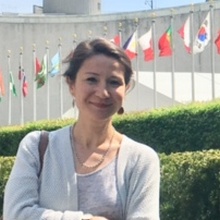
Saipira Furstenberg
RESP2REPRESSION - Understanding Host States Responses to Transnational Authoritarianism
This project examines how democratic host states respond to authoritarian repressive actions against individuals residing outside their territorial jurisdiction. Existing research has focused on the extent to which authoritarian states control, repress and police their population across borders, but few studies have considered how such interventions have been received in host states which are recipients of the diaspora community and transnational repression. The project’s interdisciplinary approach contributes to advance our understanding on the international dimension of authoritarian rule and presents solutions through building more resilient policy responses from democratic host states and institutions faced with transnational repression practices. The project is developed in collaboration with the University of Amsterdam and GIGA Berlin.
Research Institute for International Studies
Supervisor: Francesco Della Puppa, Department of Philosophy and Cultural Heritage
Duration: 24 months, from June 2022

Saretta Marotta
P.E.A.C.E. - Pius XII Holy See facing the European Attempts for a Catholic Ecumenism after WW2 (1939-1958)
P.E.A.C.E. will study the reactions and strategies developed by the Holy See towards the growth of the international ecumenical movement and its influence within European Catholicism between WW2 and the Second Vatican Council, i.e. the years of Pius XII's pontificate (1939-1958). The opening in March 2020 of new funds of the Vatican archives rekindled the attention of historians on this papacy: P.E.A.C.E. proposes not only a new subject, but also a new interpretative key to Pius XII’s pontificate. The hypothesis of the project is that these experiences of dialogue not only produced among Catholics a theological renewal that would later pave the way for the Second Vatican Council, but also that the impact of the ecumenical phenomenon caused conditioning and gradual openings in some fields within the Roman Curia. This unusual reading of Pius XII's pontificate may succeed in overturning some conventional interpretations of this papacy, explaining how dependent and consequential his choices were also in other spheres, such as in the biblical, liturgical, social and even political fields. P.E.A.C.E. will thus analyze the dynamic of action-reaction between the activity of local groups engaged in Catholic ecumenism and the surveillance and control by the Roman authorities, thus by combining the official Vatican documentation with the huge documentary heritage of individuals and institutions located all over Europe.
Research Institute for Digital and Cultural Heritage
Supervisor: Giovanni Vian, Department of Humanities
Duration: 24 months, from July 2022

Ivan Matijasic
MoCHA - Memories of Classical and Hellenistic Athens
What is left of Athenian history when historiographical texts are dismembered in later sources? The project considers the reception, changes, and rearrangement of Classical and Hellenistic historiography on Athens in lexica, etymologica and scholarly works of the Roman imperial and Byzantine ages. It aims to broaden our knowledge of the historiography on Athens, reassessing the significance of fragmentary texts, and to clarify the role of Greek lexicography and other scholarly works in transmitting these fragments. A digital resource called Digital Memories of Athens (DMoA) will be set up for collecting, analysing, and studying fragmentary texts related to Athenian history, thus allowing to provide some answers to the opening research question.
Research Institute for Digital and Cultural Heritage
Supervisor: Claudia Antonetti, Department of Humanities
Duration: 24 months, from July 2022
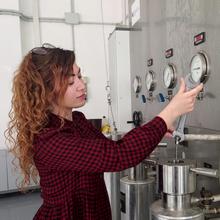
Daily Rodríguez Padrón
Green-3Dsign - Green 3D-printing Design of Advanced Catalytic Architectures
Green-3D SIGN project aims at the development of a circular economy concept employing sustainable and innovative technologies based on mechanochemical through extrusion methods (MtE) and 3D- printing. The project will focus on the valorization of waste streams of fishery industries as a source of biopolymers, with the overarching goal to identify a flexible biorefining scheme where waste management, chemical treatments of residues, and commercial promotion and production scalability are integrated.
Research Institute for Green and Blue Growth
Supervisor: Maurizio Selva, Department of Molecular Sciences and Nanosystems
Duration: 24 months, from November 2022

Máté Szalai
Innovating SSFP - Innovating Small State Foreign Policy in the Post-Covid Context – Influence-building of Small Gulf States in Global Powers
The research project aims to compare how small states of the Gulf region build their relations with superpowers such as the United States, the European Union, Russia, and China in the context of the post-CoVID-19 international order. In the framework of small state studies, the investigation seeks to unfold how Gulf actors move beyond state-level relationship-building and utilise innovative tools to foster elite-to-elite relations in various sectors, including energy, sports, and creative industries. The project will contribute not just to the demystification of the activities of small Gulf states, but also to the discussion on the role of the European Union in global politics and the improvement of theories related to small state foreign policy.
Research Institute for International Studies
Supervisor: Matteo Legrenzi, Department of Philosophy and Cultural Heritage
Duration: 24 months, from September 2022

Gergana Tzvetkova
RESIST- SteREotyping, DiSInformation, and PoliticiSaTion: links between attacks against the Istanbul Convention and increased online gender-based violence
The project examines how disinformation-driven false and harmful narratives could have a negative influence on the protection and promotion of human rights and on efforts to counter gender-based violence (GBV) against women in particular. Online GBV against women and disinformation are two phenomena posing grave risks to European Union societies. Their acuteness, exacerbated by the COVID-19 pandemic, underscores this interdisciplinary project’s strong social significance and policy relevance. Thus, the research seeks to identify and analyse in depth specific harmful and false narratives, as well as to formulate positive narratives and policy recommendations to neutralise them.
Research Institute for Social Innovation
Supervisor: Sara De Vido, Department of Economics
Duration: 24 months, from October 2022

Emanuela Vai
MIRe - Monstruous and Marvellous Musical Instruments: Digital Humanities and Renaissance Music Heritage in the Global Context
Musical instruments of the Italian Renaissance period were often elaborately decorated, featuring arabesque patterns, emblems, and carvings of fantastic, monstrous and marvellous creatures. Yet these decorative aspects have eluded critical attention. Combining 3D photogrammetry and historical archival analysis, this interdisciplinary digital humanities project will develop a digital image collection and critical analysis of musical instrument decoration and ornamentation. The project will examine what these decorative elements say about the visual, material, and (non-)auditory dimensions of early modern music cultures.
Research Institute for Digital and Cultural Heritage
Supervisor: Franz Fisher, co-supervisor Marco Sgarbi, Department of Humanities
Duration: 24 months, from January 2023
Last update: 17/04/2024
